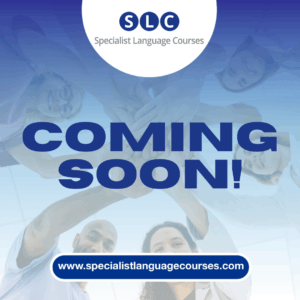
A Year to Celebrate: Thank You for Being Part of Our 2025 Journey
As 2025 comes to a close, we’ve been reflecting on what has truly been an inspiring and rewarding year for Specialist Language Courses. It has

The OET Speaking sub-test for Medicine is your opportunity to demonstrate the clinical communication and linguistic skills you use every day as a doctor. But it’s also a structured test—with specific criteria and expectations. In this article, we break down how the test works, what you’re assessed on, and how to approach each part of the role play with confidence.
The OET Speaking test for Medicine replicates real-life interactions between doctors and patients. It includes two role-plays, each lasting five minutes. Before each one, you’ll have three minutes to prepare by reading a role card outlining the situation and your tasks.
Each test starts with a warm-up (3–4 minutes) where the interlocutor asks general questions about your background. This section is not assessed.
You will always play the role of a doctor. The interlocutor will play a patient or carer. You’ll need to ask questions, gather information, explain medical conditions or treatments, and respond empathetically—just as you would in a clinical setting.
You’re scored in two main areas:
You can find full details of these on the official OET website.
During the 3 minutes before each role-play, identify:
Ask yourself:
Start naturally and clearly, for example:
“Good morning, I’m Dr King. Can you tell me what brings you in today?”
Use empathy when appropriate:
“I’m sorry to hear you’ve been in pain. That must be difficult.”
If the patient seems reluctant or worried (e.g., about attending exercise classes), acknowledge their feelings:
“I understand you might be unsure about restarting the classes, but they can really help your recovery.”
Go beyond the role card if needed. Ask:
“Is there anything in particular you’re concerned about?”
This helps you score higher in communication by actively involving the patient.
Use signposting phrases:
This helps the patient (and the assessor!) follow your communication easily.
Start with open-ended questions:
“Could you tell me more about the pain you’ve been experiencing?”
Then move to more specific ones:
“Where exactly is the pain?”
“When did it start?”
“Have you heard of muscle strain before?”
When giving information:
“How does that sound to you?”
“Do you think you’ll be able to manage that?”
Avoid giving too much information at once—break it into smaller chunks and check understanding.
Here are some effective ways to build your skills:
✅ Build a phrase bank for openings, empathy, checking understanding, giving advice, etc.
✅ Practise regularly—alone or with a partner. Use the free sample role cards from the OET website.
✅ Record and review your performance. Identify what worked well and what could be better.
✅ Repeat the same role-play to improve clarity and fluency.
✅ Practise explaining medical conditions, treatments, and lifestyle advice clearly and simply.
Watch full video here:
Download your free OET Medicine handout with example phrases and tips to practise at home.
Specialist Language Courses (SLC) are dedicated to helping healthcare professionals excel in the OET. Our expert-led courses focus on the specific language skills and test strategies needed to succeed. With personalised coaching, practice tests, and targeted exercises, we ensure you build the confidence and competence required for each OET sub-test. Join SLC to boost your chances of achieving the scores you need and advancing your healthcare career

As 2025 comes to a close, we’ve been reflecting on what has truly been an inspiring and rewarding year for Specialist Language Courses. It has

We are proud to announce the development of a new OET preparation course for all Professions, designed for healthcare professionals preparing for OET in: Dentistry,

We’re delighted to have been commissioned to provide an online ESOL programme for refugee and migrant learners by the South East Strategic Partnership for Migration
Get updates and get the latest materials on Medical English, OET and IELTS
